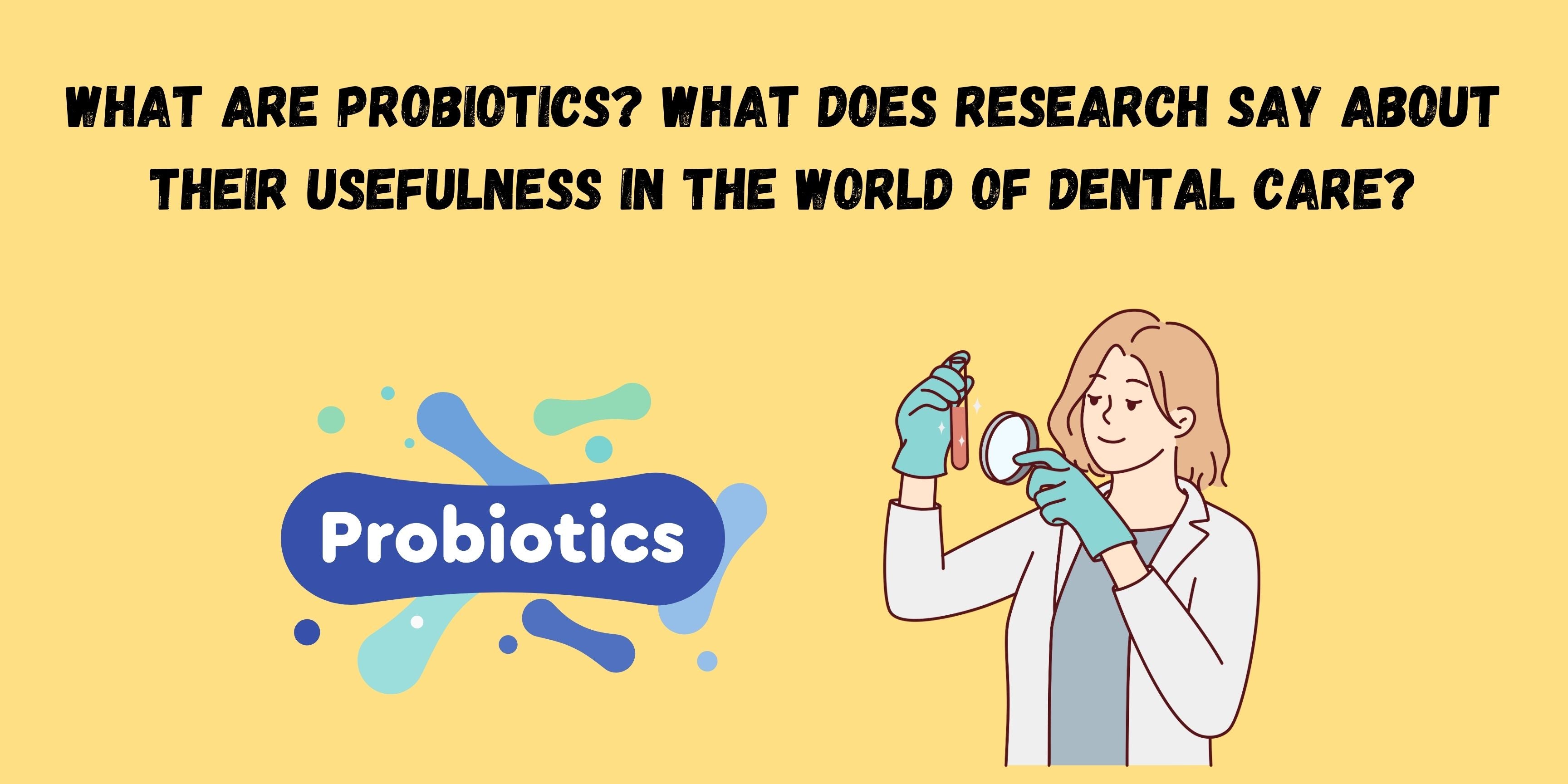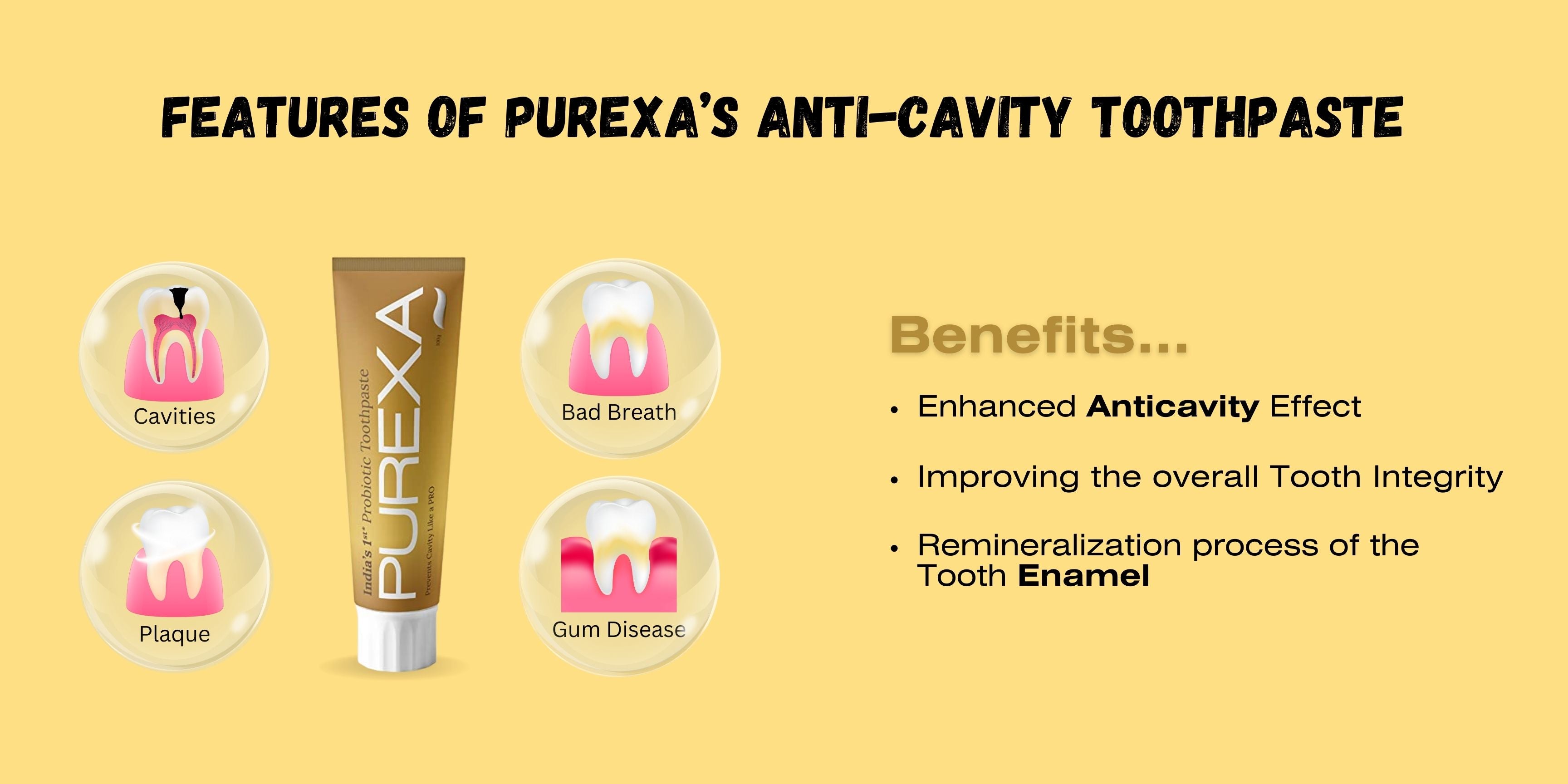From the slew of oral care products that promise to take care of your dental health, probiotics are one option receiving more and more attention in the fight for better teeth. These microscopic organisms have long been hailed for their potential to support intestinal health. They are frequently present in certain diets and supplements. However new research is showing that they may also be useful in reducing cavities in kids, who are especially vulnerable to dental caries.
Probiotics' effects on gastrointestinal problems have been thoroughly researched, but research on their impacts on dental health is still in its infancy. According to the studies conducted, the bacteria in our stomachs and mouths are related to one another and affect one another's structure and functionality. Probiotics may have an indirect impact on the oral microbiome by changing the balance of bacteria in the stomach lowering the likelihood that kids may get cavities.
In this blog, we look at how probiotics help in achieving an anti-cavity mouth.
What are Probiotics? What does Research Say About their Usefulness in the World of Dental Care?

The possible health advantages of probiotics, and dietary supplements containing helpful bacteria, are finally starting to draw attention. Probiotics were first identified as being present in fermented milk, but when they were shown to be able to compete with dangerous microbes, scientists became interested in them.
Probiotics are food supplements containing living microorganisms. They were initially studied using Lactobacillus acidophilus and Bifidobacterium bifidum.
There are both useful and dangerous bacteria in the intricate ecology that reside in the human gastrointestinal tract. "Prebiotics" are dietary ingredients that aid in the formation of helpful bacteria. Certain indigestible food elements, such as fructo-oligosaccharides and inulin, promote the growth of good bacteria while suppressing the growth of bad ones. A product is referred to as "synbiotic," signifying the synergy between the two components when it includes both prebiotics and probiotics.
Applications for probiotics can be found in numerous dental and medical disciplines, such as lowering the risk of cancer, improving the health of the gastrointestinal and urinary systems, preventing the development of dental cavities, establishing periodontal health, and lessening oral malodor. A study was conducted recently to examine current developments in probiotic use in dentistry and to draw attention to any possible dangers.
In the realm of oral health, researchers have explored the benefits of probiotic toothpaste. The oral cavity hosts a diverse array of microorganisms, playing a crucial role in the initiation and progression of dental caries. Plaque-induced caries, being a localized disease, make dentifrices the ideal vehicle for daily delivery of antibacterial agents. In recent years, adjuncts to fluorides such as probiotics and chlorhexidine have been proposed for their antiplaque and anticariogenic properties, aiming to reduce bacterial counts. This study aimed to evaluate the anticarcinogenic activity and improvement in oral health status over 45 days.
A single-blinded, parallel-group, randomized controlled clinical study was conducted among healthy adults. Thirty individuals were randomly allocated to two groups: one using probiotic dentifrice (test group) and the other receiving no intervention (control group). Saliva samples were collected and evaluated for Streptococcus mutans colony-forming units (CFU/ml of saliva) at baseline, 15th, 30th, and 45th days of follow-up.
The results indicated a significant reduction in mean S. mutans counts in the treatment group on the 45th day of follow-up. The test group exhibited antimicrobial activity, leading to a significant decrease in mean S. mutans colony counts at the 30th and 45th days. These findings suggest the potential of probiotic dentifrice in preventing dental caries and improving oral health. Further research in this area could provide valuable insights into the efficacy of probiotics for cavity prevention.
The Essential Characteristics that Help Probiotics Combat Cavities and How

Characteristics of probiotics—
- Non-Pathogenic and Nontoxic- Probiotics have to be safe to eat and shouldn't hurt or poison the host.
- Resistance to Gastric Acid- For probiotics to enter the gut alive and start working there, they must be able to endure the stomach's acidic environment.
- Adherence to Gut Epithelial Tissue- To engage with host cells and carry out their advantageous actions, probiotics must cling to the intestinal lining.
- Production of Antibacterial Substances- Probiotics help to keep a healthy microbial balance in the stomach by producing substances that prevent the growth of dangerous bacteria.
- Impact on Metabolic Processes- Probiotics can affect several metabolic processes in the digestive system, including the absorption of cholesterol and lactose. and the synthesis of vitamins.
- Factors for Colonisation- Probiotics have certain characteristics that allow them to settle in the gut and withstand being eliminated by peristalsis, which guarantees their longevity in the digestive system.
- Resistance to Bile Acids- Bacterial survival can be impacted by bile acids, which are found in the gut and should not harm probiotics.
How Probiotics Aid in Cavity Prevention—
- Colonisation- Probiotics stick to oral surfaces and aid in the preservation of good bacteria while preventing the attachment of pathogenic bacteria that cause cavities. This process is known as colonisation.
- Boosting Immune Response- By fortifying the host's defences against infections that fuel cavity growth, probiotics aid in the fight against disease.
- Creation of Antimicrobial Substances- Probiotics create substances with antimicrobial qualities that stop the growth of bacteria that cause cavities.
- Competition with Pathogens- Probiotics strive to bind with pathogenic microorganisms. locations, lessening the chance that they will colonise and produce cavities.
- Probiotics' resilience to the harsh conditions of the oral and gastrointestinal tract ensures both their longevity and their ability to prevent cavities.
- Safety- Probiotics can be used long-term to prevent cavities because they are safe to eat and do not harm the host organism.
Periodontal Infection Control—
- Periodontitis involves microbial colonization, inflammation, and immune responses.
- Probiotics offer promise in periodontitis treatment by reducing oral pH, preventing plaque formation, and producing antioxidants.
- The application of probiotic bacterial mixtures after dental cleaning suppresses harmful bacteria re-colonization, aiding periodontal health.
Halitosis Treatment—
- Probiotics combat bad breath by reducing volatile sulfur compounds.
- Gargling with probiotic solutions significantly decreases foul odours, promoting fresher breath.
Role in Dental Caries—
- Probiotics target acidogenic bacteria like mutans streptococci and lactobacilli, crucial in cavity formation.
- Strategies include using bacteria with antibacterial properties, colonization abilities, and antagonistic activity against cavity-causing bacteria.
- Genetically modified probiotics with enhanced properties, like antibodies against cavity-causing bacteria, show promise in reducing caries development.
Oral Candidosis Prevention—
- Probiotics may reduce oral Candida prevalence, potentially preventing oral candidosis.
- Lactobacilli probiotics inhibit Candida growth through acid production, promoting oral health.
Voice Prosthesis Maintenance—
- Probiotics reduce pathogenic bacteria in voice prosthetic biofilms, potentially extending prosthesis lifespan.
- Buttermilk consumption, containing antimicrobial-producing bacteria, may benefit voice prosthesis longevity.
Probiotics need not necessarily be taken in our diets or as supplements to safeguard the mouth against cavities. PUREXA probiotic Best Toothpaste for Cavity Protection is a combination of state-of-the-art science and the goodness of nature, designed to fight cavity-causing germs and promote general oral health.

Features of PUREXA’s anti-cavity toothpaste—
- Probiotic Strength- Our toothpaste actively combats S. Mutans, the cause of tooth decay, by introducing good bacteria that are packed with 200 million CFU/gm of Bacillus coagulans.
- Microbial Balance- Probiotics assist your oral microbiome to get back in balance while protecting you from frequent dental problems.
- pH Balance and Decay Reduction- Our probiotic toothpaste preserves ideal pH levels and fights off harmful bacteria to drastically lower the chance of tooth decay.
- Fluoride and Xylitol Synergy- By combining the potent properties of both fluoride and xylitol, our toothpaste fortifies tooth integrity, strengthens enamel, and delays demineralization to provide long-lasting protection against cavities.
- Natural Ingredients- Our toothpaste is made with natural ingredients and is gentle enough to provide good oral care while eliminating the bacteria from your mouth.
- Refreshing Flavour- Every brush gives you a hit of freshness that leaves your mouth feeling clean and energised. Specifically designed to address the distinct oral hygiene requirements of the Indian population, our toothpaste is your reliable ally in preserving dental health.
Suggested Read - Improve Your Oral Health By Adding Probiotic Toothpaste To Your Daily Routine?
Final Thoughts
In conclusion, there is no denying the effectiveness of probiotics in preventing cavities and enhancing oral health. Probiotics provide a safe, all-natural way to prevent cavities by rebalancing the oral microbiome, producing antibiotic compounds, and competing with harmful microorganisms.
At the vanguard of this change is PUREXA's Probiotic Toothpaste, which uses the power of good bacteria to fight S. Mutans and preserve microbial equilibrium. Our toothpaste's special blend of xylitol, fluoride, and probiotics not only prevents decay and strengthens enamel, but also guarantees a revitalising and refreshing oral care experience.
Written by Dr. Shipra Jaiswal, BDS, MDS, a Periodontist and Gums Specialist